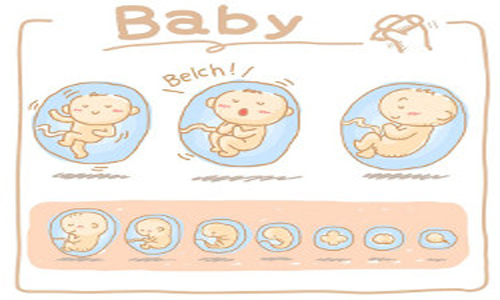Baby Hiccups During Pregnancy

Contents:
Baby Hiccups in Pregnancy
Pregnancy is a magical time overwhelming the expectant mother with happiness and awe while thinking about the long-awaited meeting. Nonetheless certain anxiety may arise if a woman feels changes inside the abdomen.
Mother-to-be may find disturbing fetal movements causing discomfort and unpleasant sensations, such as hiccup for instance.
Hiccup is a congenital reflex produced by rhythmic contraction of the respiratory muscle, which separates the diaphragm. The woman can feel hiccups starting from 28 weeks of pregnancy, but it starts much earlier – at 16 weeks and can last up 5 minutes. Every pregnant feels hiccups in her own way: some feel jerks, others clicks, the common thing is equal intervals. Long hiccups in the baby usually make the mom anxious. Little hiccups without other symptoms are safe for both the baby and the mom, while the appearance of other symptoms is a good reason to consult your doctor.
Causes of Hiccups in the Baby
- The internal cause is the irritation of one of the brain centers responsible for diaphragm motor functions. The same thing causes hiccups in adults.
- Sucking a finger the baby swallows amniotic fluid that may also cause hiccups.
- Lung development in a baby is also considered a possible cause of hiccups.
- Note that drastic change of humor in the mom may also cause hiccups in the fetus.
- Hypoxia. Lack of oxygen is characterized not only by hiccups but also by other symptoms:
- high activity in the baby is necessary to get the missing oxygen;
- bradycardia – slow heart rate in the baby;
- too strong and long-lasting hiccups;
- frequent occurrence of hiccups.
However, the above mentioned symptoms are not necessary related to hypoxia. If you suspect hypoxia, you’d better consult your gynecologist to undergo an examination. Typically, if you are diagnosed with hypoxia you should be assigned with CTG, Doppler and laboratory studies.
Consequences
Actually, hiccups in the baby are a natural process that doesn’t make him any harm or testify of development abnormalities. Of, course you should keep in mind hypoxia, though the chances are very small. In case of oxygen insufficiency, apart from long-lasting hiccups the baby will also move actively or conversely calm down and hide. In such a situation, the woman should see her doctor in a timely manner and share her concerns with him.
The doctor will listen to the baby's heartbeat using a stethoscope, make cardiotocography (CTG) and if necessary an ultrasound of the fetus. This set of studies allows to known for sure how the baby is feeling, whether he has enough oxygen.
Hiccups Treatment
- walks in the fresh air provide oxygen for the baby and reduce chances of hiccups occurrence;
- proper nutrition;
- moderate activity also reduces chances of hiccups appearance;
- change the position of the body, for example, lie down;
- avoid cooling;
- if hiccups in caused by fetal hypoxia, after an examination the doctor will prescribe you a treatment. In addition to treatment, it’s advisable to walk in the fresh air and rest.
It is important to know that hiccups are a sign of the fetal CNS normal development and it isn’t worth worrying about it. You should appreciate the time of your pregnancy, get ready for the delivery and seeing your baby. It is important not to spoil this moment by your anxiety and complaints turning it into a time that you would like to forget.